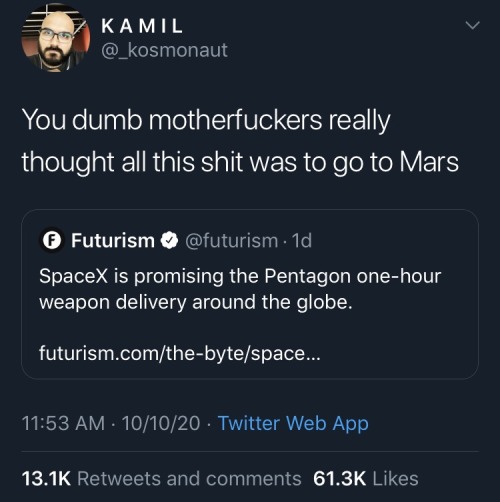Slim-k-d - Untitled

More Posts from Slim-k-d and Others

It's an open notes test and some dense motherfuckers still can't figure out the answers.
To ravish
It is easy to make light of this kind of “writing,” and I mention it specifically because I do not make light of it all: it was at Vogue that I learned a kind of ease with words (as well as with people who hung Stellas in their kitchens and went to Mexico for buys in oilcloth), a way of regarding words not as mirrors of my own inadequacy but as tools, toys, weapons to be deployed strategically on a page. In a caption of, say, eight lines, each line to run no more or less than twenty-seven characters, not only every word but every letter counted. At Vogue one learned fast, or one did not stay, how to play games with words, how to put a couple of unwieldy dependent clauses through the typewriter and roll them out transformed into one simple sentence composed of precisely thirty-nine characters. We were connoisseurs of synonyms. We were collectors of verbs. (I recall “to ravish” as a highly favored verb for a number of issues, and I also recall it, for a number of issues more, as the source of a highly favored noun: “ravishments,” as in tables cluttered with porcelain tulips, Faberge eggs, other ravishments.) We learned as reflex the grammatical tricks we had learned only as marginal corrections in school (“there are two oranges and an apple” read better than “there were an apple and two oranges,” passive verbs slowed down sentences, “it” needed a reference within the scan of the eye), learned to rely on the OED, learned to write and rewrite and rewrite again. “Run it through again, sweetie, it’s not quite there.” “Give me a shock verb two lines in.” “Prune it out, clean it up, make the point.” Less was more, smooth was better, and absolute precision essential to the monthly grand illusion. Going to work for Vogue was, in the late nineteen-fifties, not unlike training with the Rockettes. Telling Stories, Let Me Tell You What I Mean, Joan Didion.

I can write the saddest poem of all tonight. I loved her, and sometimes she loved me too.
Pablo Neruda / Tonight I Can Write


A three-star U.S. Army general thinks that Elon Musk’s foreign business relationships could make him a significant threat to national security.
Retired Lieutenant General Russel Honoré argued in a Sunday New York Times column that the SpaceX CEO’s willingness to capitulate to Chinese demands over the years should make his recent influence within Trump’s circle all the more questionable.
Honoré referenced 2023 quotes from Musk’s DOGE buddy Vivek Ramaswamy to make his case. “I have no reason to think Elon won’t jump like a circus monkey when Xi Jinping calls in the hour of need,” Ramaswamy said in an interview. “It’s deeply concerning that @elonmusk met with China’s foreign minister yesterday to oppose decoupling and referred to the U.S. & Communist China as ‘conjoined twins,’” he wrote in another statement that year. “The U.S. needs leaders who aren’t in China’s pocket.”
Ramaswamy has since made amends with Musk, but his concerns still apply. Musk and SpaceX have already been flagged thrice by the Air Force, the Defense Department’s Office of Inspector General, and the undersecretary of defense for intelligence and security for failing to disclose his meetings with foreign leaders, something his current security clearance requires him to do. And his China business isn’t going anywhere either.
Musk has borrowed at least $1.4 billion from Chinese government–controlled banks to pay for his massive Tesla “gigafactory” in Shanghai. He borrowed this money knowing full well that China’s laws allow the Chinese Communist Party to demand information from any company doing business in China in exchange for doing business there—a huge red flag for Honoré.
“Mr. Musk’s business dealings in China could require him to hand over sensitive classified information, learned either through his business interests or his proximity to President-elect Donald Trump. No federal agency has accused him of disclosing such material, but as Mr. Ramaswamy put it, China has recognized that U.S. companies are fickle,” Honoré wrote. “Mr. Musk’s relationship with China’s leaders could prove a problem for America’s national security given that SpaceX has a near monopoly on the United States’ rocket launches … the last thing the United States needs is for China to potentially have an easier way of obtaining classified intelligence and national security information.”
This has drawn the ire of Democrats and Republicans alike. In 2022, Senator Marco Rubio accused Tesla of obstructing justice for the CCP, and in 2023 he introduced a bill to stop NASA and other federal agencies from giving contracts to companies connected to the Chinese Communist Party. Two Democratic senators very recently called for a probe into Musk’s “reliability as a government contractor and a clearance holder” because of his reported phone call with Vladimir Putin.
The line between civilian and elected official has become blurrier as Musk further cements himself as part of Trump’s inner circle. As Honoré wrote, the world’s richest man funding Trump’s return to the presidency “does not give the incoming White House the license to look the other way at the national security risks he may pose.”

how’s that house that raised you?
Close up of Pluto from the New Horizons space probe.

Will be adding several more photos to this same post










-
 beginerbondage liked this · 1 week ago
beginerbondage liked this · 1 week ago -
 theatrebugstuff liked this · 1 week ago
theatrebugstuff liked this · 1 week ago -
 supremehammy liked this · 1 week ago
supremehammy liked this · 1 week ago -
 otf4lyfe liked this · 1 week ago
otf4lyfe liked this · 1 week ago -
 mythicsacademy liked this · 1 week ago
mythicsacademy liked this · 1 week ago -
 madeardarling liked this · 2 weeks ago
madeardarling liked this · 2 weeks ago -
 demboysintheyard liked this · 2 weeks ago
demboysintheyard liked this · 2 weeks ago -
 easilydistractedandamused reblogged this · 2 weeks ago
easilydistractedandamused reblogged this · 2 weeks ago -
 p1ayer0001 liked this · 2 weeks ago
p1ayer0001 liked this · 2 weeks ago -
 chocolatezebra liked this · 2 weeks ago
chocolatezebra liked this · 2 weeks ago -
 lillypadcrochet liked this · 2 weeks ago
lillypadcrochet liked this · 2 weeks ago -
 dandelioncasey reblogged this · 2 weeks ago
dandelioncasey reblogged this · 2 weeks ago -
 satanstruemistress reblogged this · 2 weeks ago
satanstruemistress reblogged this · 2 weeks ago -
 timbereric liked this · 2 weeks ago
timbereric liked this · 2 weeks ago -
 too-many-beloveds liked this · 2 weeks ago
too-many-beloveds liked this · 2 weeks ago -
 superparanormalstuff liked this · 2 weeks ago
superparanormalstuff liked this · 2 weeks ago -
 yondamoegi liked this · 2 weeks ago
yondamoegi liked this · 2 weeks ago -
 bearinarockingchair liked this · 2 weeks ago
bearinarockingchair liked this · 2 weeks ago -
 onyxrosemuse liked this · 2 weeks ago
onyxrosemuse liked this · 2 weeks ago -
 sourpeachgummy liked this · 2 weeks ago
sourpeachgummy liked this · 2 weeks ago -
 littleinkdrop liked this · 2 weeks ago
littleinkdrop liked this · 2 weeks ago -
 evergrowingbelly liked this · 2 weeks ago
evergrowingbelly liked this · 2 weeks ago -
 mystorl reblogged this · 2 weeks ago
mystorl reblogged this · 2 weeks ago -
 horsesharkinahatadventures liked this · 2 weeks ago
horsesharkinahatadventures liked this · 2 weeks ago -
 jennifersfaults liked this · 2 weeks ago
jennifersfaults liked this · 2 weeks ago -
 rooftile-mcgee liked this · 2 weeks ago
rooftile-mcgee liked this · 2 weeks ago -
 flavoredmine liked this · 2 weeks ago
flavoredmine liked this · 2 weeks ago -
 markerspensandink liked this · 2 weeks ago
markerspensandink liked this · 2 weeks ago -
 imbadatnamez liked this · 2 weeks ago
imbadatnamez liked this · 2 weeks ago -
 cristybug0207 liked this · 2 weeks ago
cristybug0207 liked this · 2 weeks ago -
 banananutbustin liked this · 2 weeks ago
banananutbustin liked this · 2 weeks ago -
 2016-homestuck liked this · 2 weeks ago
2016-homestuck liked this · 2 weeks ago -
 mysisterforcedmyhand reblogged this · 2 weeks ago
mysisterforcedmyhand reblogged this · 2 weeks ago -
 jaybirdbluelily reblogged this · 2 weeks ago
jaybirdbluelily reblogged this · 2 weeks ago -
 rosesareredjaybirdsareblue reblogged this · 2 weeks ago
rosesareredjaybirdsareblue reblogged this · 2 weeks ago -
 rosesareredjaybirdsareblue liked this · 2 weeks ago
rosesareredjaybirdsareblue liked this · 2 weeks ago -
 larrikinlark liked this · 2 weeks ago
larrikinlark liked this · 2 weeks ago -
 aro-aizawa reblogged this · 2 weeks ago
aro-aizawa reblogged this · 2 weeks ago -
 villainsex reblogged this · 2 weeks ago
villainsex reblogged this · 2 weeks ago -
 villainsex liked this · 2 weeks ago
villainsex liked this · 2 weeks ago -
 nonbinannytranny reblogged this · 2 weeks ago
nonbinannytranny reblogged this · 2 weeks ago -
 nonbinannytranny liked this · 2 weeks ago
nonbinannytranny liked this · 2 weeks ago -
 chaosthedemon liked this · 2 weeks ago
chaosthedemon liked this · 2 weeks ago -
 riotous-lightning liked this · 2 weeks ago
riotous-lightning liked this · 2 weeks ago -
 syfouu liked this · 2 weeks ago
syfouu liked this · 2 weeks ago -
 romanthe liked this · 2 weeks ago
romanthe liked this · 2 weeks ago -
 letswonderspirit liked this · 2 weeks ago
letswonderspirit liked this · 2 weeks ago -
 morgepork reblogged this · 2 weeks ago
morgepork reblogged this · 2 weeks ago
